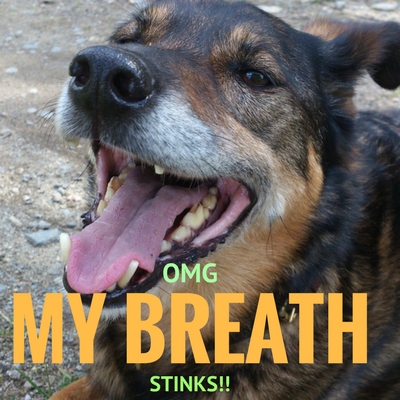
Why does my dog have bad breath you ask? I’m going to say it’s because you haven’t been brushing your dog’s teeth!!
From experience it seems many people believe bad breath is a normal thing, and why would you think of questioning something that’s normal? I know I wouldn’t!
The truth is, bad breath is nature’s way of telling you your dog is having some oral hygiene issues, which need to be addressed as soon as possible. The reason it’s quite time sensitive is – dental disease not only causes all kinds of problems with your dog’s teeth and gums, including pain, but in serious cases can cause organ damage.
Shocking I know, but true!
READ THIS ⇒ Dog Dental Care
How did this happen?
If you haven’t been brushing your dog’s teeth, don’t beat yourself up about it, it’s possible you weren’t aware you could or should be doing it. Although some vets have looked at my dog’s teeth during a routine checkup and pointed out if they had found tartar, shockingly not one ever mentioned any preventative measures I could have taken. Surgery as a solution was always discussed, but nothing else.
What to do now
First of all don’t panic. Bad breath may mean there are things going on in your dog’s mouth that need to be addressed, but it does not automatically mean serious or surgery.
Second of all, make an appointment to see your vet as soon as possible, because waiting means the problem gets worse.
[bctt tweet=”Bad breath in dogs is not normal, but is a sign of dental disease. Please take him to the vet ASAP as he is probably in pain.” username=”petcrusader”]
Appointment day
Your vet will have a good look around your dog’s mouth, and give you his opinion based on what he sees. Perhaps he has a minor infection and antibiotics will take care of it, or he may need a cleaning. If surgery is recommended, he can only tell you what he thinks based on a visual, but the true state of your dog’s mouth can really only be known once your dog is sedated, and x rays have been taken. Your vet will discuss all of this with you during your appointment, and will provide you with a written estimate. If he doesn’t, please ask for one.
He may want your permission, in advance, to do what needs to be done once he’s in surgery, or he can call you during the operation to get your “go ahead” when he knows exactly what needs to be done.
Ask lots of questions during your appointment, because if he calls while your dog is under anesthetic he won’t have time to chat.
Prevent bad breath in dogs
The source of your dog’s bad breath has been discovered and dealt with, so let’s talk prevention. While there are no guarantees he’ll never need medical intervention again, there are lots of things you can do to reduce the likelihood.
Implementing all of the recommendations below is ideal, but we have to be realistic. Not all dogs will be as cooperative as we would like, so doing even one thing is better than doing nothing.
Regular brushing
Daily is the best, but as often as possible is good too! Doggie toothbrushes come in various styles, so finding one your dog will tolerate may be a matter of trial and error. The same goes for types and flavours of toothpaste.
Brushless brushing
How about a flat cotton pad wrapped around your finger, add a bit of toothpaste and rub your finger around her teeth? Even a few seconds will be of some benefit.
Dental powders can be added to your dog’s food, which reacts to the saliva to clean the teeth.
Dental sprays work in much the same way as powders, it’s just the delivery system that is different.
Water additives
It’s as simple as adding it to your dog’s water bowl.
Dog dental chews
Whether that’s a raw bone (consult with your vet first), or store bought dental chews, giving your dog something hard to chew on can help. Read ingredient labels because many of the popular brands are nothing more than junk food, and can cause your dog to put on weight.
Chew toys
There are many different types of chew toys, you should find something your dog likes! From braided ropes to rubber toys with ridges and bumps, they’ll all help.
Why does my dog have bad breath – conclusion
I hope you found this information beneficial, and you see how many ways you can help keep your dog’s mouth in good condition. I have extremely uncooperative dogs so I can’t brush their teeth every day, or ever in the case of one of them, but there are still plenty of other things I can do, as you can, to make a difference.
How did your vet appointment go? What was the source of your dog’s bad breath? What treatment was recommended and how have you been managing your dog’s new dental care routine? Sharing helps others so please leave a comment below, or on my Facebook page.
Get your FREE report – Tell Tail Signs Your Dog May Have Dementia

 Why Does My Dog Sleep So Much
Why Does My Dog Sleep So Much
Leave a Reply